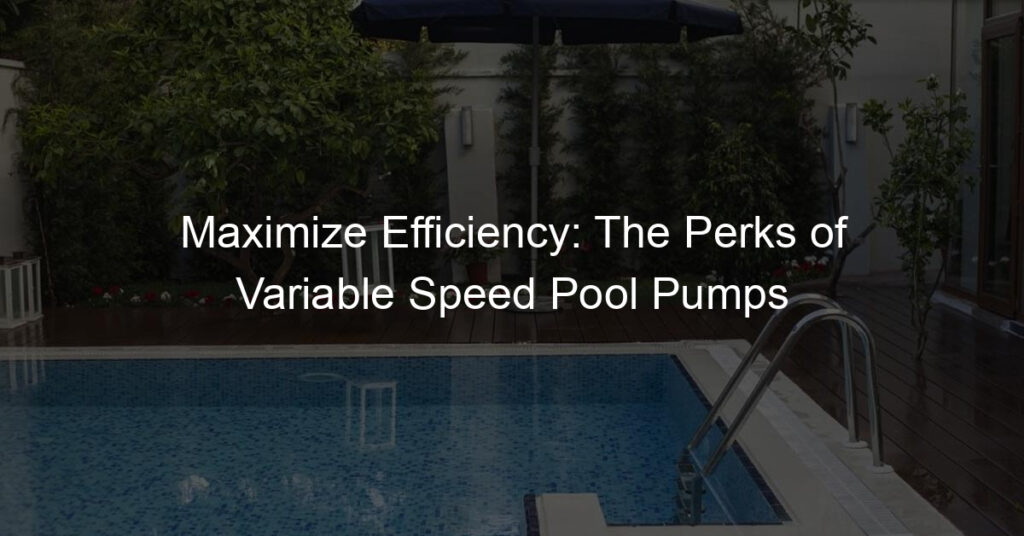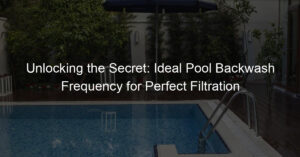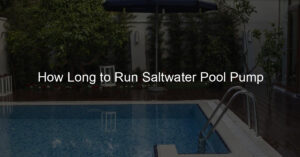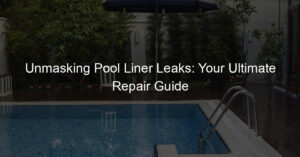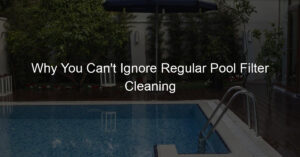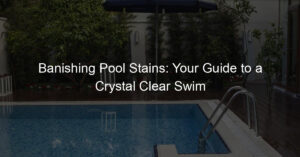Introduction to Variable Speed Pool Pumps
Swimming pools are a great addition to any home, providing a place for relaxation, exercise, and fun. But to keep the water clean and safe, a good pool pump is essential. One of the most efficient types of pool pumps is the variable speed pool pump. Let’s dive into what these pumps are and how they work.
- Definition of Variable Speed Pool Pumps
- How Variable Speed Pool Pumps Work
A variable speed pool pump is a type of pool pump that can operate at different speeds. Unlike single-speed pumps that only run at one speed, variable speed pumps can be adjusted to run at the speed that is most efficient for the task at hand. This means they can run slower when filtering the pool water and faster when needed for tasks like vacuuming the pool or running a pool heater.
Variable speed pool pumps use a technology called a permanent magnet motor, which is the same type of motor used in electric cars. This motor allows the pump to run at any speed, from very slow to very fast. The speed is controlled by a digital control panel on the pump, which allows you to set the speed to exactly what you need for each task. This makes these pumps very efficient, as they only use the energy they need to perform the task at hand.
In the following sections, we will delve deeper into the benefits of variable speed pool pumps, how they contribute to energy efficiency, and how they can help you maintain your swimming pool in a cost-effective manner. Stay tuned to learn more about this high-performance pool equipment and how it can save you money in the long run.
Benefits of Pool Pumps
Pool pumps are a vital component of any swimming pool. They serve multiple purposes, from circulating water to filtering out debris. But what are the benefits of using pool pumps? Let’s delve into the three key benefits: energy efficiency, cost-effectiveness, and improved pool maintenance.
- Energy Efficiency
- Cost-effectiveness
- Improved Pool Maintenance
One of the primary benefits of pool pumps is their energy efficiency. Modern pool pumps are designed to consume less electricity while still delivering optimal performance. This not only helps in reducing energy consumption but also contributes to a greener environment. For instance, variable speed pool pumps can adjust their speed based on the pool’s needs, which can save up to 90% of energy compared to single-speed pumps.
Pool pumps can also be cost-effective in the long run. While the initial cost may be higher, the savings on energy bills can quickly offset this. Moreover, high-quality pool pumps tend to have a longer lifespan, which means you won’t have to replace them as often. This makes them a cost-effective investment for any pool owner.
Lastly, pool pumps play a crucial role in maintaining the cleanliness and health of your pool. They circulate the water, ensuring that it is evenly heated and properly filtered. This helps in preventing the growth of algae and bacteria, keeping your pool clean and safe for use. With a good pool pump, you can spend less time on maintenance and more time enjoying your pool.
In conclusion, pool pumps are an essential piece of equipment for any pool owner. They provide numerous benefits, from energy savings to improved pool maintenance. So, if you want to keep your pool clean, safe, and cost-effective, investing in a high-quality pool pump is a wise decision.
Energy Efficient Pool Pumps
When it comes to maintaining your swimming pool, energy efficiency is a key factor to consider. One of the most important pieces of equipment in this regard is the pool pump. Energy efficient pool pumps not only save you money on your energy bills, but they also contribute to a healthier environment by consuming less power.
How Energy Efficient Pool Pumps Work
Energy efficient pool pumps work on the principle of variable speed technology. Unlike traditional single-speed pumps, these pumps can adjust their speed according to the pool’s needs, resulting in significant energy savings. Let’s delve into the specifics.
- Energy Saving Mechanisms
- Comparison with Traditional Pool Pumps
Energy efficient pool pumps use advanced technology to adjust their speed and power consumption based on the pool’s requirements. When the pool needs less circulation, the pump slows down, saving energy. Conversely, when more circulation is needed, the pump speeds up. This flexibility results in significant energy savings compared to traditional single-speed pumps, which always operate at maximum speed.
Traditional pool pumps operate at a single speed, regardless of the pool’s needs. This can lead to unnecessary energy consumption and higher energy bills. On the other hand, energy efficient pool pumps adjust their speed based on the pool’s needs, resulting in lower energy consumption and reduced energy bills. In fact, energy efficient pool pumps can save up to 80% in energy costs compared to traditional single-speed pumps.
In conclusion, energy efficient pool pumps are a smart investment for any pool owner. They not only save money on energy bills but also contribute to a healthier environment by reducing energy consumption.
Benefits of Energy Efficient Pool Pumps
Energy efficient pool pumps provide a range of benefits that make them a smart choice for any pool owner. Let’s explore two of the most significant advantages.
- Reduced Energy Bills
- Environmentally Friendly
One of the most immediate and noticeable benefits of energy efficient pool pumps is the reduction in energy bills. Traditional pool pumps can consume a significant amount of energy, leading to high utility costs. However, energy efficient pool pumps are designed to operate at variable speeds, which allows them to use less energy and still perform effectively. This can result in substantial savings on your energy bills. For example, a study found that pool owners who switched to energy efficient pumps saved an average of 30% to 45% on their energy costs.
Another significant benefit of energy efficient pool pumps is their positive impact on the environment. By using less energy, these pumps reduce the amount of carbon emissions produced. This helps to combat climate change and contributes to a healthier planet. Additionally, energy efficient pool pumps often have longer lifespans than traditional pumps, which means fewer pumps end up in landfills. By choosing an energy efficient pool pump, you’re not just saving money, you’re also making a positive contribution to the environment.
In conclusion, energy efficient pool pumps offer significant benefits, both for your wallet and for the environment. They are a smart investment for any pool owner looking to save money and reduce their environmental impact.
Pool Pump Technology
Pool pump technology has seen significant advancements over the years. These improvements have made pool pumps more efficient, reliable, and user-friendly. Let’s delve into the evolution of pool pump technology and understand the journey from single speed to variable speed pumps, and the technological advancements in pool pump design.
Evolution of Pool Pump Technology
The pool pump technology has evolved significantly over the years, making it easier for pool owners to maintain their pools effectively. Let’s take a look at how this technology has progressed.
- From Single Speed to Variable Speed
- Technological Advancements in Pool Pump Design
Originally, pool pumps were single speed, meaning they operated at one constant speed. However, they were not energy efficient and had limited control options. The introduction of variable speed pumps marked a significant milestone in pool pump technology. Variable speed pumps allow pool owners to adjust the speed of the pump according to their needs, leading to energy savings and improved pool water quality.
Over the years, pool pump designs have also seen significant improvements. Modern pool pumps are equipped with advanced features like digital control panels, built-in timers, and self-diagnostic capabilities. These features not only make pool maintenance easier but also help in prolonging the life of the pump. Additionally, the use of durable materials in pump construction has led to more robust and long-lasting pool pumps.
In conclusion, the evolution of pool pump technology has brought about significant benefits for pool owners. From energy efficiency to ease of use, modern pool pumps offer a host of advantages over their older counterparts. As technology continues to advance, we can expect even more improvements in pool pump design and functionality in the future.
Future of Pool Pump Technology
As we look ahead, the future of pool pump technology is exciting and promising. It’s all about making pool maintenance easier, more efficient, and more cost-effective. Let’s explore two key advancements that are set to revolutionize the way we manage our pools.
- Smart Pool Pumps
- Integration with Home Automation Systems
Smart pool pumps are the next big thing in pool pump technology. These pumps are designed to be intelligent and responsive. They can adjust their speed and power based on the pool’s needs, making them incredibly energy-efficient.
Imagine a pump that can detect when your pool is dirty and automatically increase its power to clean it up. Or a pump that slows down when your pool is clean, saving you energy and money. That’s the kind of smart technology we’re talking about!
Another exciting development is the integration of pool pumps with home automation systems. This means you can control your pool pump from your smartphone or tablet, wherever you are.
Need to turn on the pump while you’re away from home? No problem. Want to schedule your pump to run at off-peak times when electricity is cheaper? Easy. With home automation integration, managing your pool becomes a breeze.
In conclusion, the future of pool pump technology is all about smart, automated solutions that make pool maintenance a hassle-free task. With these advancements, you can look forward to a future where your pool is always clean, your energy bills are lower, and your pool pump does all the hard work for you.
Variable Speed Pumps Advantages
Variable speed pool pumps are a game-changer in the world of swimming pool maintenance. They offer a range of benefits that make them a smart choice for pool owners. Let’s delve into the key advantages of these innovative pumps.
- Speed Control for Optimal Performance
- Quiet Operation
- Longer Lifespan
One of the main advantages of variable speed pumps is their ability to control speed. Unlike single-speed pumps, variable speed pumps allow you to adjust the speed based on your pool’s needs. This means you can run your pump at a lower speed for everyday filtration and crank it up when you need more power, like after a pool party. This flexibility leads to optimal performance and energy efficiency.
Variable speed pumps operate much quieter than their single-speed counterparts. This is because they run at lower speeds most of the time, reducing noise levels. So, you can enjoy a peaceful swim or relax by the pool without the constant hum of the pump in the background.
Variable speed pumps are designed to last longer. Since they operate at lower speeds, they experience less wear and tear. This means they require fewer repairs and replacements, saving you money in the long run. Plus, a longer lifespan means less waste, making variable speed pumps a more environmentally friendly choice.
In conclusion, variable speed pumps offer a host of advantages, from speed control and quiet operation to a longer lifespan. They are a smart investment for any pool owner looking to improve efficiency, reduce noise, and save money.
Swimming Pool Maintenance
Maintaining a swimming pool is crucial for its longevity and your enjoyment. One of the key components in this process is the pool pump. Let’s dive into the role of pool pumps in maintenance.
Role of Pool Pumps in Maintenance
Pool pumps play a significant role in maintaining the cleanliness and health of your swimming pool. They are responsible for two main tasks: water circulation and filtration.
- Water Circulation
- Filtration
Water circulation is the first step in pool maintenance. The pool pump pulls water from the pool, circulates it through the filter, and pushes it back into the pool. This process helps distribute chemicals evenly throughout the pool, keeping the water clean and safe for swimming.
The second role of pool pumps is filtration. As the water is circulated, it passes through the pool filter. This filter traps and removes debris, dirt, and other contaminants from the water. This process ensures that the water in your pool is crystal clear and healthy to swim in.
In conclusion, pool pumps are the heart of your swimming pool’s maintenance system. They ensure that the water is continuously circulated and filtered, keeping your pool clean and inviting. Remember, a well-maintained pool pump leads to a well-maintained pool.
Maintenance Tips for Pool Pumps
Keeping your pool pump in good shape is crucial for the overall maintenance of your swimming pool. Here are a couple of simple yet effective tips to ensure your pool pump functions efficiently.
- Regular Cleaning
- Proper Speed Settings
Cleaning your pool pump regularly is the first step towards its proper maintenance. Over time, debris and other particles can accumulate in your pump, causing it to work harder than necessary. This not only reduces its efficiency but can also lead to damage. It’s recommended to clean your pump at least once a week. This involves removing any visible debris and rinsing the pump basket with a hose. Remember, a clean pump is a happy pump!
Variable speed pool pumps allow you to adjust the speed at which the pump operates. This is a fantastic feature that can help you save energy and money. However, it’s essential to set the speed correctly. If the speed is too high, the pump may work harder than necessary, leading to wear and tear. On the other hand, if the speed is too low, the pump may not circulate the water effectively, leading to a dirty pool. It’s recommended to consult with a pool professional to determine the optimal speed settings for your pool size and usage.
Remember, regular maintenance of your pool pump can extend its lifespan and ensure your swimming pool remains clean and healthy. Don’t neglect these simple tips, as they can make a significant difference in the long run.
Cost-effective Pool Pumps
When it comes to maintaining your swimming pool, the pump plays a crucial role. But did you know that the type of pool pump you choose can significantly impact your wallet? Let’s explore how cost-effective pool pumps can save you money in the long run.
- Initial Investment vs Long-term Savings
- Case Study: Cost Savings with Variable Speed Pool Pumps
It’s true that some pool pumps may seem expensive at first glance. However, it’s important to consider the long-term savings that these pumps can provide. For instance, variable speed pool pumps, though they may cost more upfront, can save you a significant amount of money over time. They do this by using less energy, which means lower electricity bills. So, while the initial investment might be higher, the long-term savings make it a cost-effective choice.
Let’s look at a real-world example to better understand the cost savings. A recent case study found that a homeowner was able to save up to $1,000 per year on their electricity bill by switching to a variable speed pool pump. This means that within a few years, the pump had paid for itself and then some. This case study clearly shows the potential for significant cost savings with variable speed pool pumps.
In conclusion, while the initial cost of a pool pump can be a significant investment, it’s important to consider the long-term savings. By choosing a cost-effective pool pump, such as a variable speed model, you can save a significant amount of money over time. So, when it comes to pool pumps, it pays to think long-term.
Pool Pump Speed Control
Controlling the speed of your pool pump is a crucial aspect of maintaining your swimming pool. It not only helps in keeping the water clean but also contributes to energy efficiency. Let’s delve into the details.
- Understanding Different Speed Settings
- Optimizing Speed for Different Pool Activities
- Filtration: Run the pump at low speed for regular filtration. It’s enough to keep the water clean and clear.
- Cleaning: Increase the speed to medium when using a pool vacuum or robotic cleaner. This ensures proper suction and thorough cleaning.
- Heating or Backwashing: Use high speed when you need to heat the pool quickly or backwash the filter. However, remember to switch back to a lower speed once done to save energy.
Pool pumps come with different speed settings, usually ranging from low, medium, to high. The speed setting you choose will depend on the size of your pool and the type of activity you’re performing.
Low speed is ideal for basic filtration and is the most energy-efficient setting. Medium speed is suitable for cleaning the pool using a vacuum or a robotic cleaner. High speed is typically used for backwashing the filter or running a pool heater. Remember, the higher the speed, the more energy the pump consumes.
Adjusting the speed of your pool pump according to the activity can help you save energy and maintain a clean pool. Here are some tips:
By understanding and optimizing the speed settings of your pool pump, you can maintain a clean and healthy pool while saving on energy costs.
In conclusion, pool pump speed control is an essential aspect of pool maintenance. It allows you to perform various activities efficiently and contributes to energy conservation. So, make sure you understand your pool pump’s speed settings and use them wisely.
High-performance Pool Pumps
When it comes to maintaining a clean and healthy swimming pool, high-performance pool pumps are a must-have. These pumps are designed to provide superior performance, ensuring that your pool water stays clean and clear. Let’s dive into the world of high-performance pool pumps and explore their features and the top brands in the market.
- Features of High-performance Pool Pumps
- Energy Efficiency: These pumps are designed to consume less energy, resulting in significant savings on your electricity bills.
- Variable Speed: High-performance pumps often come with variable speed settings, allowing you to adjust the speed according to your needs.
- Quiet Operation: Unlike traditional pool pumps, high-performance pumps operate quietly, ensuring a peaceful environment around your pool.
- Long Lifespan: Built with high-quality materials, these pumps are designed to last for many years, providing excellent value for money.
- Top Brands in the Market
High-performance pool pumps come packed with a range of features that make them stand out from the crowd. Here are a few key features:
There are several brands that have made a name for themselves in the high-performance pool pump market. Here are a few of the top ones:
| Brand | Key Features |
|---|---|
| Pentair | Energy-efficient, quiet operation, variable speed |
| Hayward | Long lifespan, energy-efficient, easy to install |
| Jandy | Variable speed, quiet operation, durable construction |
In conclusion, high-performance pool pumps are an excellent investment for any pool owner. They offer superior performance, energy efficiency, and a long lifespan, making them a cost-effective solution for maintaining a clean and healthy pool.
Energy Saving Pool Equipment
When it comes to maintaining a swimming pool, energy efficiency is a crucial factor to consider. Not only does it help in reducing the environmental impact, but it also significantly cuts down on your utility bills. Let’s explore some other energy-saving pool equipment that can help you achieve this.
Other Energy Saving Pool Equipment
Besides pool pumps, there are other types of equipment that can help save energy in your pool. Here are a couple of them:
- Energy Efficient Heaters
- Solar Powered Pool Equipment
Heating your pool can consume a lot of energy, especially during the colder months. Energy-efficient heaters are designed to heat your pool using less energy. They do this by capturing and using the heat from the surrounding air, reducing the need for electricity or gas. This can result in significant energy savings, making your pool more cost-effective to maintain.
Another excellent way to save energy in your pool is by using solar-powered equipment. This includes solar heaters, solar pool covers, and even solar-powered pool lights. These devices use the power of the sun to operate, reducing your reliance on traditional energy sources. Not only does this save energy, but it also helps to reduce your carbon footprint, making your pool more environmentally friendly.
In conclusion, energy efficiency is an important aspect of pool maintenance. By investing in energy-saving equipment like energy-efficient heaters and solar-powered devices, you can significantly reduce your pool’s energy consumption and make it more cost-effective and environmentally friendly.

